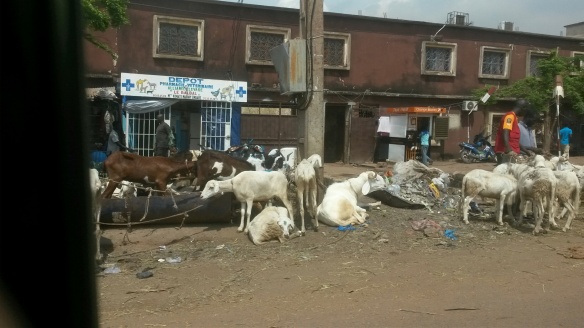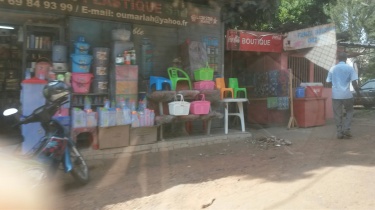
Sheep along the road in Bamako @Mirjam, mob phone
El-Eid Tabaski in Bamako
It is Friday 9 September and I am sitting in a taxi that takes me through traffic-congested Bamako. Sheep are packed along the roads, waiting to be eaten during the Muslim feast of Tabaski on Monday, 12th. People are in town to organize this feast: to get their hair done, buy new clothes, and buy sheep. Bamako is busy. Yesterday, the driver of the 4W-drive big car of the organization which invited me, Groupe Odyssee, funded by the Dutch Embassy, was complaining. Sheep are expensive and clothing the family is almost impossible, but one has to do it. The taxi driver this Friday is shouting as he navigates through the city – at the moto taxis, at the pedestrians who do not watch out, at the congested roads, and the bad roads. And then at each roundabout he calls some children hanging around to give them a kind of millet cookies. He explains: it is Friday-sadaqa, a gift for those who do not have anything on the holy Friday, the Muslim prayers day.The children are twins, from poor mothers. I see poverty not only at these roundabouts. More than I remember (but memory is a tricky thing) young people are sitting along the roads, doing nothing, while many others are doing small jobs, carrying heavy loads, selling nil, trying to make a living. Bamako is full and more (young) people are coming every day. The mountains are no longer green, the bush is replaced by houses. Houses that are shacks. But also, as in every town in Africa, big houses of those who do well. They do well despite the war, and despite economic difficulties. The contrast pains.

shops along the road @Mirjam, mob phone
War
It is war in Mali. One can feel it and one can see it in Bamako. The occupation of the North in 2012 has deeply affected the city. Especially the attacks that followed after as a direct consequence of the situation in the North. Hotels are barricaded, soldiers are on the street, military is visible everywhere. But this feeling is especially fed by the stories and the analysis made by friends and colleagues. They do not see much good in the government. The president, Ibrahim Boubacar Keita (IBK) is becoming dissociated from the people. The last actions to clean the city are just an example. The déguerpissement of the sides of the streets, sweeping away the small shacks that are the shops and workshops of (often young) people who have no jobs and try to make something out of nothing every day. They lost to make place for the Summit de la Francophonie to be held in Bamako in 2017. People are angry about this and see their vote for IBK go up in smoke. He does not do much for them.
Urban youth protest!
Recently (mid-August) one of the most popular radio-journalists and public figure was arrested: Ras-Bath (Youssouf Mohamed Bathily). He was arrested because he was telling the truth about the situation in Mali, questioning the actions of the government. Ras-Bath has his own radio show ‘Carte sur Table’ and is extremely popular among young people. When he was arrested many youth from Bamako went to the street to support him. Facebook was invaded with support messages. The government is not keen on demonstrating youth and the demonstration was oppressed with two young people killed. Subsequently the mobile internet connections were shut down.
Boni Youth
Early September another event reached the headquarters of the international press: Boni, a small town in central Mali, was occupied by ‘jihadists’.The story is a little fuzzy. Apparently the military had retreated from Boni, leaving it in the hands of the population. The youth groups, so-called Jihadists, who have their camps in the region, took their chance to manifest their power and ‘conquered’ Boni… for a few days. The military finally took it back. Instead of questioning what happened and who these young military, associating clearly with jihadist movements, are, they are coined as terrorists and will be trialed if they can be arrested. But indeed, who are these young men, part of the youth population of Mali?
Disgruntled youth
In another blog and a publication of Boukary Sangaré, we tried to find out what is behind these stories other than criminal acts and terrorism. They are also part of the disgruntled youth, who form more than 60% of the Malian population and who feel that there is not enough attention for them, that they are forgotten. The Boni youth have a pastoral nomadic background. Pastoral nomads in central Mali feel marginalized and indeed their livelihood is threatened by shrinking pasture areas, difficulties related to ecology, and now the insecurity in the region. These pastoral youth have no real future within their own livelihood and tend to search for other possibilities, among which the Jihadist movements.
Mali is expected to be one of the youngest nations in the near future, with more than 60% of its population younger than 25. They need a future. Although the Boni and Urban youth seem to differ a lot, they do share conditions of life and the impossibility to build a future: feeling (and being) marginalized, no employment, poverty. Changing ministers in the government will not help to solve these problems. NGOs and international programs propose as one of the solutions the creation of employment for the youth. This sounds as a possibility to relieve part of the problem, but as so far shown creating jobs is not easy in a poverty economy. Furthermore, even when young people are invited to give their take on the solution of the problems in international forums or discussions organized by NGOs, these are often not the illiterate youth from poor urban neighborhoods, or from pastoral nomads communities.
Life continues
And while poverty and youth mingle, multiple billions are spent on the UN peace mission in Mali that dominates and creates the city today, and the Malian government will spend lots of money on the reception of the Summit de la Francophonie in January 2017. The (educated) elites profit from the NGO machinery that was set in motion. The sheep will be killed, many children will not be dressed as they should have been for Tabaski, although their parents tried their best. The youth will quell a whole history of frustrations with another tea. When will the youth be invited to join the negotiation tables?
